“Ecumenism is a necessary exercise of giving and taking, listening and talking. Churches of the ecumenical movement may with this exercise have a fundamental, unified message for our national and European decision-makers,” said Dr Jørgen Skov Sørensen, General Secretary of the Conference of European Churches (CEC) in his address at a conference organised by the Estonian churches.
The conference was held in Tallinn and titled “20 years of the Protocol of Common Interests of the Government of the Republic of Estonia and the Estonian Council of Churches”. The event took place on 17 October hosted by the Estonian Council of Churches.
The CEC General Secretary described CEC’s role in Europe and how public theology is evolving.
“It is an art to be political. Especially as a church. It takes knowledge, competence and experience to navigate our political institutions with a message rooted in faith,” he said.
Dr Sørensen shared how there have been high-level encounters between church and society propelled by Article 17 of the Lisbon Treaty. However, he stressed that not every church can have a seat around the table in the Commission or the European Parliament at these dialogue meetings. “This is where the Conference of European Churches comes in, located literally a stone's throw from the Berlaymont building, the seat of the Commission” in Brussels, he added.
He went on to say that “CEC has retained the role of a bridge builder – not only between East and West but between churches and the European institutions. The preparation, execution and follow-up of the major events involving consultations or meetings with European politicians form an important part of our work to contribute to the development of European societies.”
The conference was significant since CEC will hold its 2023 CEC General Assembly in Tallinn from 14 – 20 June, exploring the theme “Under God’s blessing – shaping the future,” hosted by CEC Member Churches in Estonia.
The participants of the conference also met with the Estonian Prime Minister Kaja Kallas, who deeply appreciated the cooperation between Estonian government and the local churches. She expressed admiration for Estonian churches’ support to their congregations during Corona crisis, as well as following Russia’s brutal attack on Ukraine, in helping people who fled the war.
“Tough times are ahead. It's important to ensure that the mental and spiritual needs of our people are met. Thank you churches for always being there for people when they need you,” she said.
Among other speakers at the conference were Archbishop Urmas Viilma, Chairman of the Riigikogu Jüri Ratas, State Secretary Taimar Peterkop, Religious Affairs Advisor of the Ministry of the Interior Ringo Ringvee, Doctor of Theology Ingmar Kurg, Counselor-Chief Chaplain Katri Aaslav-Tepandi, Minister of Public Administration Riina Solman, Minister of Social Protection, Signe Riisalo, Member of the Parliament Henn Põlluaas and Fr. Mattias Palli from Orthodox Church of Estonia.
For more information or an interview, please contact:
Naveen Qayyum
Communication Officer
Conference of European Churches
Rue Joseph II, 174 B-1000 Brussels
Tel. +32 486 75 82 36
E-mail: naveen@cec-kek.be
Website: www.ceceurope.org
Facebook: www.facebook.com/ceceurope
Twitter: @ceceurope
YouTube: Conference of European Churches
Subscribe to CEC news
